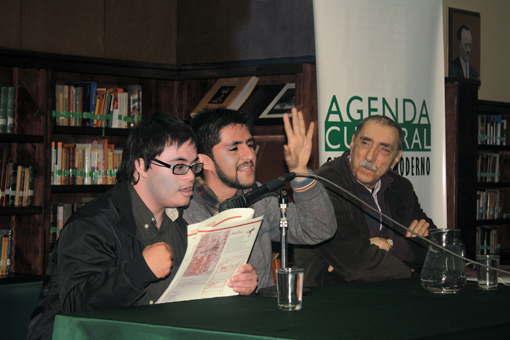Mauricio Díaz, a 26-year-old Colombian journalist currently studying for a Masters in cultural studies at the Universidad de los Andes, has transformed his passion for literature into a means of achieving social change. Fundación Fahrenheit 451, the brainchild of Díaz and a group of college students with a common passion for literature, started in 2007 as a nonprofit organization based in Bogotá that uses literature to promote the social inclusion of underserved populations. But the founders soon realized that they needed a literary vehicle of their own. The result: a literary magazine with the same name—Fahrenheit 451—that has become one of Colombia’s most intriguing publications.
Both the foundation and the magazine are tongue-in-cheek appropriations of Ray Bradbury’s 1953 dystopian novel that imagines a society in which books are outlawed, even burned, by authorities. Like Díaz, who oversees the foundation’s projects, magazine director Javier Osuna, 26, and editor Sergio Gama, 28, maintain that the progress of society depends on the cultivation of the mind—and that means introducing the pleasures of reading to as many people as possible, including those who don’t have easy access to literature. They call it the “democratization of words.”
Fahrenheit 451 carries the work of emerging local writers and poets as well as international stars such as Sonia Nazario and Ryszard Kapuscinski. The magazine is freely distributed during the annual Literature Festival in Bogotá, when public spaces throughout the city host a series of storytelling workshops, poetry readings and cultural activities. The festival’s activities are free, and they have attracted over 8,000 people since debuting in 2010.
The festival and magazine are vehicles for Fahrenheit 451’s principal aim: promoting social change in Colombia. The foundation works with vulnerable youth in Bogotá by presenting literature as an alternative to drugs, gangs and violence. Through its Proyecto Despertar (Project Awakening) it has also helped more than 70 people with cognitive disabilities develop literary and artistic skills. In partnership with Fundación Saldarriaga Concha, an organization that supports initiatives for older adults and people with disabilities, Fahrenheit 451 reaches more than 2,000 seniors in cities like Medellín, Cartagena and Cali by inviting them to write their stories and narrate their life experiences as a means of preserving the communities’ cultural identity.
Fahrenheit 451’s successful model of social inclusion is grant-driven. It has earned the support of the Colombian Ministry of Culture, a large network of volunteers, and local libraries, theaters, schools, and museums that have partnered with Fahrenheit 451 to produce the festival and implement the foundation’s many social programs. In 2012, the Inter-American Development Bank (IDB) recognized Díaz as a “Young Change Agent” for promoting social innovation in Colombia. The foundation’s success has enabled its founders to reach out to communities with little access to the cultural riches available in major cities. One project under way focuses on the southwestern department of Caquetá and targets older adults who were victims of violence.
Yet Díaz has found it hard to win the same support from the private sector. More visible or audience-friendly cultural activities like theater and dance get more attention than literature. He believes that the need for more cultural investment is a common challenge across Latin America, but literature is the hardest to sell. “There’s only so much we can do,” he says. “People have to appropriate the spaces we have created for them to share their stories and ideas. Only then will they be able to fully realize the potential of literature to achieve social inclusion and preserve their cultural identity.”





